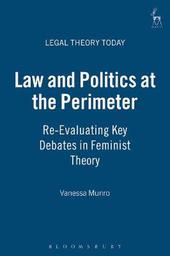
|
Law and Politics at the Perimeter: Re-Evaluating Key Debates in Feminist Theory
Paperback / softback
Main Details
| Title |
Law and Politics at the Perimeter: Re-Evaluating Key Debates in Feminist Theory
|
| Authors and Contributors |
By (author) Dr Vanessa E Munro
|
| Series | Legal Theory Today |
|---|
| Physical Properties |
| Format:Paperback / softback | | Pages:182 | | Dimensions(mm): Height 234,Width 156 |
|
| ISBN/Barcode |
9781841133522
|
| Classifications | Dewey:340.082 |
|---|
| Audience | | Postgraduate, Research & Scholarly | |
|---|
|
Publishing Details |
| Publisher |
Bloomsbury Publishing PLC
|
| Imprint |
Hart Publishing
|
| Publication Date |
23 October 2007 |
| Publication Country |
United Kingdom
|
Description
Feminist critique has made a significant impact both in terms of informing our theoretical approach to law and politics as social phenomena, and in terms of encouraging the development of increased opportunities and protection for individual women. Despite its successes, however, feminist thought has suffered from internal disagreements and schisms. Whilst united by their commitment to highlight and undermine gender-based discrimination, disparate feminist theorists have disagreed over a range of issues central to that project. In particular, there has been long-standing feminist debate over the utility of legal reform tactics, the patriarchal nature of the State, and the legitimacy of woman-centred methodology and grand-theorising. The ferocity of these debates has intensified in contemporary times with the increasing reception of postmodern and pluralist analyses. Vehemently against the establishment of meta-narratives or essentialist accounts of generic womanhood, the postmodern insistence on subversion over critique, and on dislocation over collectivism, has severed an already fragile link between feminist theory and practice. Set against this backdrop, this book offers a critical re-appraisal of contemporary feminist legal and political theory. It re-visits key feminist debates over the origins of patriarchy, as well as over the role of liberalism and the rule of law in its creation and perpetuation. It re-evaluates feminist calls for the dislocation of legal reform strategies and rights-based claims. And it draws upon the work of 'mainstream' analytical jurists, as well as philosophers like Foucault and Wittgenstein, to re-cast the terrain around key concepts of power, identity and equality within feminist political theory.
Author Biography
Vanessa Munro is a Professor of Law at Nottingham University. In 2010 she was awarded a prestigious Philip Leverhulme Prize by the Leverhulme Trust.
ReviewsMunro's ability skilfully to analyse and critique feminist literature while using it in conjunction with mainstream liberal work on respect produces a further important contribution to this richness and variety, whilst seeking to retain links between theory and practice. However, it is her work on Foucault which may prove to be most enriching. -- Jill Marshall * Journal of Law and Society, Vol 35, No 4 * ...a measured engagement and indeed one of the strengths of the book is the elegant way in which it lays out different sides of feminist debate. Munro has a knack for lucid communication of complex ideas and arguments, making the book a particularly attractive tool for teaching...one of the most striking contributions to feminist legal theory is Munro's engagement with anti-essentialism in Chapter 5. This is a strongly original analysis which successfully endeavours to move beyond the political and theoretical stalemate which the anti-essentialist critique of sexbased categories yielded...a welcome and timely intervention into feminist legal theory which provokes and challenges feminist legal scholars to reconsider the nature, direction, achievements and future priorities of feminism in law. It is also a thoroughly accessible and manageable book, to be enjoyed selectively-chapter by chapter-or as a single ordered narrative with which one might well at points disagree but nevertheless find a productive and fruitful read. -- Joanne Conaghan * Feminist Legal Studies, 17: 229-231 *
|